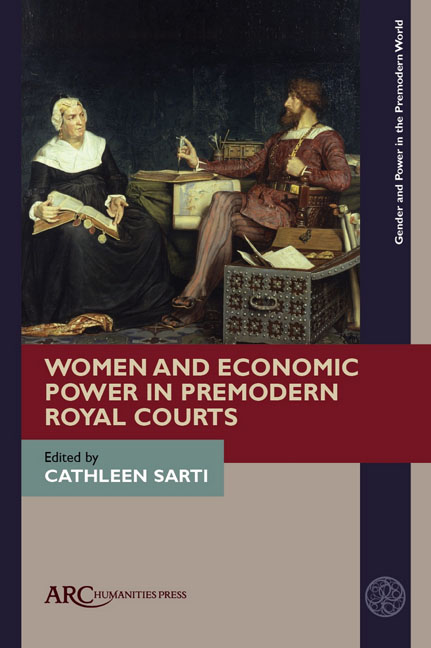Book contents
- Frontmatter
- Contents
- Acknowledgements
- Introduction: Women and Economic Power in Premodern Royal Courts
- 1 The Medieval English Queen as Landholder: Some Reflections on Sources and Methodology
- 2 Financial Power of Empresses and Princess Consorts of the Holy Roman Empire
- 3 “Edward III’s Gold-Digging Mistress”: Alice Perrers, Gender, and Financial Power at the English Royal Court, 1360– 1377
- 4 Counselling the Danish King: Sigbrit Villoms as Financial Mastermind for Christian II, 1513– 1523
- Afterword: “Power Is Money”? Reflections on Money, Power, Sex, and Gender in Premodern Royal Courts
- Bibliography
- Index of Persons and Topics
Afterword: “Power Is Money”? Reflections on Money, Power, Sex, and Gender in Premodern Royal Courts
Published online by Cambridge University Press: 20 November 2020
- Frontmatter
- Contents
- Acknowledgements
- Introduction: Women and Economic Power in Premodern Royal Courts
- 1 The Medieval English Queen as Landholder: Some Reflections on Sources and Methodology
- 2 Financial Power of Empresses and Princess Consorts of the Holy Roman Empire
- 3 “Edward III’s Gold-Digging Mistress”: Alice Perrers, Gender, and Financial Power at the English Royal Court, 1360– 1377
- 4 Counselling the Danish King: Sigbrit Villoms as Financial Mastermind for Christian II, 1513– 1523
- Afterword: “Power Is Money”? Reflections on Money, Power, Sex, and Gender in Premodern Royal Courts
- Bibliography
- Index of Persons and Topics
Summary
As Cathleen Sarti noted in the introduction to this volume, it has often been said that money is power. When examining the situation of royal women or those in the orbit of the monarch, we can see that the reverse is perhaps more accurate— their proximity to the centre of political power in the realm also gives them access to financial resources, which in turn enhances their own personal power and agency. These women are converting economic capital into other forms of capital— namely power and influence, and vice versa.
Those with money and power are subject to great scrutiny, envy, and suspicion— particularly when the financial resources are those which in theory belong to the crown and by extension to the realm itself. This dynamic can be further complicated by both sex and gender— the patriarchal political framework of premodern royal courts meant that women were not always seen as the natural conduits or controllers of economic resources. In the cases highlighted in this volume, a further layer is added through the sexual aspect of these women's relationship with the ruler adding suspicion that their (financial) power and influence were increased through their intimacy with the monarch. A final complication is that these women were perceived as “outsiders” as well, being either foreigners or from outside the royal caste— or, in Sigbrit Villoms's case, both. This combination of factors has led to criticism of women in premodern courts who openly demonstrated their economic political influence, particularly when it crossed beyond the expected area of their role. Yet, when they exercised financial agency within the boundaries of their position, for example in terms of the careful administration by consorts of their lands and household budgets, their prudence and effective management have often been ignored by their contemporaries and academics.
This collection has offered several excellent case studies for an area which is in real need of further examination— the economic and political influence and agency of women in royal courts. Recent decades have seen incredible activity in terms of the fields of women's history, royal and court studies, as well as economic and political history, and yet researchers have performed little joining of the dots to draw out the connections between them.
- Type
- Chapter
- Information
- Women and Economic Power in Premodern Royal Courts , pp. 87 - 92Publisher: Amsterdam University PressPrint publication year: 2020



